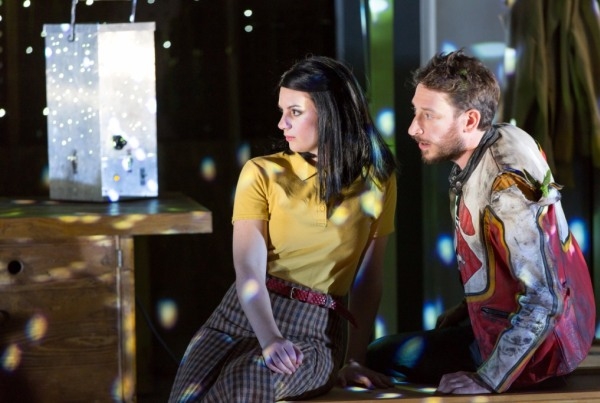The Virtues of Things (Royal Opera House)

© Stephen Cummiskey
Dozens of new operas have graced the soon-to-be-gutted Linbury Studio stage, but the hit list hasn’t been great. More outers than inners I’m afraid. One memorable bull’s-eye was Heart of Darkness, a work driven by Tom Phillips’s masterly libretto and a score by Tarik O’Regan that inspired powerful aesthetic responses. Small wonder it’s just opened to enthusiastic reviews in San Francisco.
I mention it now because such evenings nourish hope for every subsequent new work that’s announced in the Royal Opera House’s cinderella space. Sadly, The Virtues of Things, an 80-minute opera composed by Matt Rogers, turns out to be more parochial and confused than most.
The De Selby family makes props for opera companies. Their pride in traditional craft methods is threatened by the arrival of Eames, a bright young techie designer who considers their ways outmoded and offers to "upskill their toolbox". So far, so straightforward; but presently things take a lurch to the left and the surreal takes over.
The opera, set to a prolix libretto by Sally O’Reilly, is a joint commission by The Royal Opera, Aldeburgh Music and Opera North. Heady stuff; but the board that greenlit it must have resembled the suits in W1A – keen to score right-on brownie points by presenting themselves as forward-looking investors in eclectic young talent (Rogers has a background in computer games, his librettist is a writer on art). Either that or they mistook woolly thinking for intellectual challenge when, as she does in her programme note, O’Reilly enthused about hollow archetypes and meta-registers. Cool.
Five first-rate singers flounder with the material but they deliver it like stars. Fiona Kimm, David Stout and Robyn Allegra Parton are the Selbys, the excellent tenor Paul Curievici is Eames and Richard Mosley-Evans makes a couple of brief appearances as a doctor. The Aurora Orchestra is kept busy by Rogers’s frenetic orchestrations; they’re hyperactive and often arresting but, crucially for an opera, only sporadically do they shed light on the action (although I enjoyed the moment when the instruments ‘answered’ a phone call). Nevertheless, the originality of the composer’s popping wind figures and criss-crossing aural patterns augurs well for future interest.
You’ll know if Virtues is for you by the extent to which character names like Ellipsis and Parabola tickle your funny bone, and by how you respond to the laboured wordplay that lards the libretto. It certainly looks fine in Giles Cadle‘s realistic workshop designs, and lighting designer Matt Haskins shines in the last half hour when visual effects come to the fore; but it’s not enough. Director Bijan Sheibani struggles to create dramatic interest and even sets the cast on collective tiptoe as a desperate running gag.
Nobody seems to have asked who it's for. Richard Baker, an excellent musician and the opera’s committed conductor, declares that The Virtues of Things "articulates many of the most pressing aesthetic concerns of artists and composers today". He doesn’t mention audiences.
Further performances of The Virtues of Things at the Linbury Theatre on 5 & 6 May, Snape Maltings on 9 May and the Howard Assembly Rooms, Leeds, on 15 May 2015.










